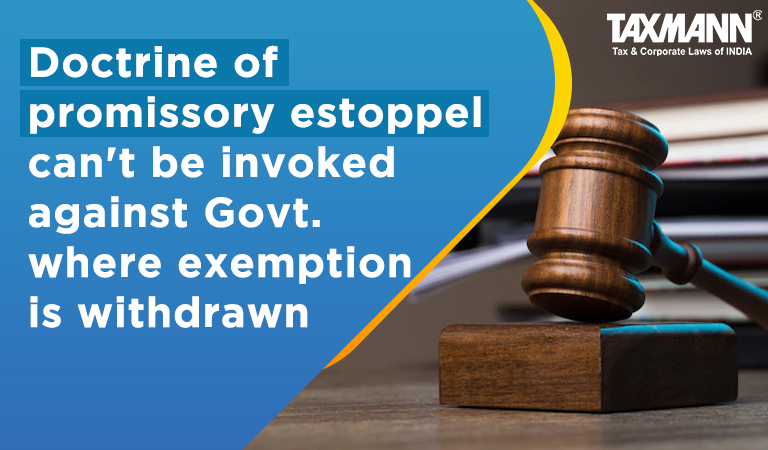Doctrine of promissory estoppel can’t be invoked against Govt. where exemption is withdrawn
- News|Blog|GST & Customs|
- 2 Min Read
- By Taxmann
- |
- Last Updated on 7 January, 2023

Case Details: Godrej Consumer Products Limited vs Union of India and others - [2023] 146 taxmann.com 111 (Jammu & Kashmir and Ladakh)
Judiciary and Counsel Details
-
- Mohan Lal & Tashi Rabstan, JJ.
- Pranav Kohli, Sr. Adv. Vineet Nagla & Arun Dev Singh, Advs. for the Petitioner.
- Jagpaul Singh, Sr. CGSC Ms Pallavi Sharma & Ravinder Gupta for the Respondent.
Facts of the Case
The taxpayer is engaged in FMCG had a manufacturing unit eligible for exemption. They made the expansion with the impression that the exemption would continue in GST. Also, the new units were established post-GST era whose permission was already taken in pre-GST era.
The benefit of the Budgetary support scheme was rejected as the unit was established after the GST was implemented whereas the benefit of the scheme was available only where the unit was established pre-GST. The contention of the assessee that the approval was taken pre-GST era was not acceptable.
High Court Held
It was further held that the benefit of promissory estoppel would not be applicable in the case of withdrawal of exemption notification as the withdrawal of exemption in public interest is a matter of policy as in the exercise of the statutory power of the state under law. The court cannot bind the Government to its policies decision when the same is changed/revised/withdrawn in the nature of public interest. Court cannot interfere with fiscal policy where government acts in public interest unless fraud or lack of bona fide intention is established. Hence the said doctrine cannot be invoked in the present case.
Disclaimer: The content/information published on the website is only for general information of the user and shall not be construed as legal advice. While the Taxmann has exercised reasonable efforts to ensure the veracity of information/content published, Taxmann shall be under no liability in any manner whatsoever for incorrect information, if any.

Taxmann Publications has a dedicated in-house Research & Editorial Team. This team consists of a team of Chartered Accountants, Company Secretaries, and Lawyers. This team works under the guidance and supervision of editor-in-chief Mr Rakesh Bhargava.
The Research and Editorial Team is responsible for developing reliable and accurate content for the readers. The team follows the six-sigma approach to achieve the benchmark of zero error in its publications and research platforms. The team ensures that the following publication guidelines are thoroughly followed while developing the content:
- The statutory material is obtained only from the authorized and reliable sources
- All the latest developments in the judicial and legislative fields are covered
- Prepare the analytical write-ups on current, controversial, and important issues to help the readers to understand the concept and its implications
- Every content published by Taxmann is complete, accurate and lucid
- All evidence-based statements are supported with proper reference to Section, Circular No., Notification No. or citations
- The golden rules of grammar, style and consistency are thoroughly followed
- Font and size that’s easy to read and remain consistent across all imprint and digital publications are applied



 CA | CS | CMA
CA | CS | CMA
